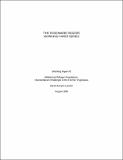| dc.description.abstract | This paper examines the conditions under which refugee flows cause conflict to spread across borders. In order to develop propositions, the paper studies a group of Bosnian Muslim refugees who formed an army to retake their hometown. The situation of those refugees suggests that external political conditions, especially support from the refugee receiving state, determined the ability of the refugees to mobilize militarily. The presence of non-civilian elements among the refugees and the influence of powerful refugee leaders acted as necessary, but not sufficient, conditions that led to violence. The Bosnian Muslim case confirms that the actions of humanitarian agencies are constrained by the level of available resources and the attitude of the receiving state. Within those constraints, UNHCR and NGOs may attempt to prevent, reduce, or ignore political violence that involves refugees. | en_US |
